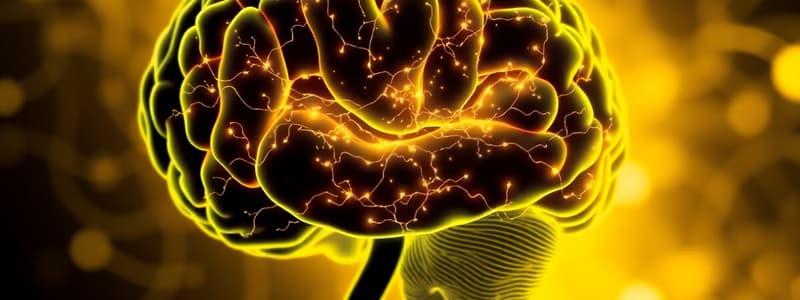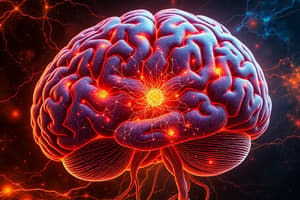Podcast
Questions and Answers
Which statement best describes Lamarck's theory regarding the inheritance of traits?
Which statement best describes Lamarck's theory regarding the inheritance of traits?
- Acquired characteristics can be inherited over generations. (correct)
- Traits developed during an individual's lifetime are not passed to the offspring.
- Obsolete traits will disappear entirely in future generations.
- Evolution occurs solely through environmental pressures without genetic influences.
How does Darwin’s view on genetic variation differ from Lamarck's theory?
How does Darwin’s view on genetic variation differ from Lamarck's theory?
- Darwin believed that selective breeding negates genetic variability.
- Darwin's theory centers on genetic differences being inherently random. (correct)
- Darwin suggested that all variations lead to evolution without any selection pressure.
- Darwin emphasized the role of environmental influence on acquired traits.
Which statement accurately reflects the influence of environment on personality development?
Which statement accurately reflects the influence of environment on personality development?
- The environment can modify innate traits, leading to diverse personalities. (correct)
- Environmental factors have no significant impact on personality traits.
- Personality traits are solely determined by genetic inheritance.
- Personality traits are resistant to changes when external conditions shift.
What is the primary mechanism through which natural selection operates?
What is the primary mechanism through which natural selection operates?
What role do selective breeding and natural selection play in the evolution of species like dogs?
What role do selective breeding and natural selection play in the evolution of species like dogs?
What is the primary reason early humans selected dogs for specific tasks?
What is the primary reason early humans selected dogs for specific tasks?
Which statement best summarizes the concept of 'survival of the fittest' as it pertains to genetic transmission?
Which statement best summarizes the concept of 'survival of the fittest' as it pertains to genetic transmission?
How do mutations affect genetic heritability of personality traits?
How do mutations affect genetic heritability of personality traits?
What differentiates natural selection from selective breeding in dogs?
What differentiates natural selection from selective breeding in dogs?
What role do environmental contexts play in the variation of personality traits?
What role do environmental contexts play in the variation of personality traits?
Which aspect of personality would be more likely to be favored by natural selection?
Which aspect of personality would be more likely to be favored by natural selection?
What does phenotypic variation result from in the context of natural selection?
What does phenotypic variation result from in the context of natural selection?
What is one reason why genetic variation in personality traits has not been eliminated over millions of years of evolution?
What is one reason why genetic variation in personality traits has not been eliminated over millions of years of evolution?
What is a potential result of frequency-dependent selection in a population of Hawks and Doves?
What is a potential result of frequency-dependent selection in a population of Hawks and Doves?
Why is altruism considered a complex behavior from an evolutionary standpoint?
Why is altruism considered a complex behavior from an evolutionary standpoint?
What does the existence of variance within a personality trait signify in terms of evolution?
What does the existence of variance within a personality trait signify in terms of evolution?
How does evolutionary psychology propose personality traits are developed?
How does evolutionary psychology propose personality traits are developed?
What is one distinction between Darwin's and Lamarck's theories regarding evolution?
What is one distinction between Darwin's and Lamarck's theories regarding evolution?
Which statement best describes the role of environment in shaping personality traits?
Which statement best describes the role of environment in shaping personality traits?
In what way do selective pressures influence the breeding of dogs?
In what way do selective pressures influence the breeding of dogs?
What is an example of how personality traits can reflect evolutionary adaptation?
What is an example of how personality traits can reflect evolutionary adaptation?
Flashcards
Domestication of Animals
Domestication of Animals
The process where humans select and breed animals with desired traits, like strength or intelligence.
Natural Selection
Natural Selection
Process where organisms with traits better suited to their environment are more likely to survive and reproduce, passing those traits to offspring.
Phenotype
Phenotype
Observable characteristics of an organism, like size, color, and behavior.
Genotype
Genotype
Genetic information underlying a phenotype; the set of genes an organism has.
Signup and view all the flashcards
Adaptive Fitness
Adaptive Fitness
An organism's ability to survive and reproduce in its environment.
Signup and view all the flashcards
Mutations
Mutations
Errors in gene duplication that lead to variations within a species’ genetic makeup.
Signup and view all the flashcards
Genetic Variation
Genetic Variation
Differences in inherited genes among individuals of a species.
Signup and view all the flashcards
Personality Traits & Adaptive Fitness
Personality Traits & Adaptive Fitness
Whether personality characteristics help an organism survive and reproduce in its environments.
Signup and view all the flashcards
Lamarck's Inheritance
Lamarck's Inheritance
The idea that traits acquired during an organism's lifetime can be passed directly to offspring.
Signup and view all the flashcards
Adaptive Genes
Adaptive Genes
Genes that help an organism survive and reproduce better in a particular environment.
Signup and view all the flashcards
Charles Darwin
Charles Darwin
British naturalist and geologist who proposed the theory of evolution by natural selection.
Signup and view all the flashcards
Frequency-dependent selection
Frequency-dependent selection
A concept where individuals compete for resources using different strategies, and the success of each strategy depends on the frequency of the other strategies in the population.
Signup and view all the flashcards
Hawk strategy
Hawk strategy
A competitive strategy where individuals aggressively compete until they are injured or their opponent gives up.
Signup and view all the flashcards
Dove strategy
Dove strategy
A cooperative strategy where individuals give in to aggression.
Signup and view all the flashcards
Evolutionarily Stable Strategy
Evolutionarily Stable Strategy
A strategy that, if adopted by most of the population, cannot be improved upon by another strategy.
Signup and view all the flashcards
Personality traits
Personality traits
Traits that are naturally selected and have evolved to help organisms solve adaptive problems.
Signup and view all the flashcards
Altruism
Altruism
Acting for the well-being of others, possibly sacrificing your own well-being or life.
Signup and view all the flashcards
Sociobiology
Sociobiology
The study of how behavior patterns become ingrained.
Signup and view all the flashcards
Evolutionary Psychology
Evolutionary Psychology
The study of how ancient evolution influences present-day behavior and personality.
Signup and view all the flashcardsStudy Notes
Biological/Evolutionary Perspectives PS338
- Biological perspectives examine the brain and its role in personality and behavior.
- Key aspects of the brain examinable with technology include brain anatomy, neurochemistry (effects of neurotransmitters and hormones on brain processes).
- These aspects are directly relevant to personality and behavior.
Research Methods for Studying the Brain
- Brain damage: Methods involve studying damage cases such as Phineas Gage, or lesions.
- Brain stimulation: Mostly studies on animals, but also occasionally on conscious humans. Methods include transcranial magnetic stimulation (TMS), and transcranial direct current stimulation (tDCS).
- Brain activity and imaging: Methods used to directly observe brain functioning. Techniques like electroencephalography (EEG), magnetoencephalography (MEG), computed tomography (CT) scans, positron emission tomography (PET), and functional magnetic resistance imaging (fMRI) are employed.
- Difficulties with imaging techniques: All parts of the brain are active to some degree. Blood oxygenation level dependent (BOLD) imaging and perfusion imaging signals can be misleading about which part of the brain is active at any given time. Most research concentrates on small areas of the brain, making it difficult to see the neural context effect. Studying brain activity and imaging is difficult and expensive.
Personality and the Brain
- The illustration shows various parts of the brain, including the corpus callosum, cingulate cortex, frontal cortex, basal ganglia, hypothalamus, amygdala, thalamus, hippocampus, brain stem, spinal cord, afferent nerves, and efferent nerves.
The Amygdala
- Links perceptions and thoughts with emotional meaning.
- Plays a role in negative and positive emotions.
- Assesses whether a stimulus is threatening or rewarding.
- Relevant traits include anxiety, fearfulness, sociability, and sexuality.
- Relevant for motivation (e.g., Whitman murders, 1966).
The Frontal Lobes and the Neocortex
- Involved in higher cognitive functions.
- Related to emotional processing: pleasant emotions (left), unpleasant emotions (right), approach (left), and withdrawal (right).
- Includes the inhibition of reactions to unpleasant stimuli.
- Related to emotional stability (left), and neuroticism (right); propensity to get angry (left).
- Also relevant to social and emotional understanding, self-control, and regulation of impulses and feelings. Case studies on Phineas Gage (1848) and Elliott are mentioned.
- Associated with the Somatic marker hypothesis.
The Anterior Cingulate
- Important for experiencing normal emotions.
- Influences the control of emotional responses and behavior impulses.
- Possibly linked to positive and negative affective differences between extraversion and neuroticism (e.g. Charles Whitman).
Brain Systems
- The brain is highly interconnected.
- The persistence system connects frontal cortex and striatum.
- The C-system connects lateral PFC, hippocampus, medial temporal lobe, and posterior parietal cortex.
- The X-system connects vmPFC, amygdala, and lateral temporal cortex.
- There is a neural context effect in the functioning of brains.
The Biochemistry of Personality
-
Galen proposed that personality is influenced by the balance of humors (blood, black bile, yellow bile, and phlegm).
-
The chemistry of the brain depends on neurotransmitters like the chemicals: Endorphins.
-
Neurons communicate using neurotransmitters.
-
Another related chemical: Hormones that stimulate neural activity.
-
Associated brain systems: Central and peripheral nervous system.
Eysenck's Biological Basis of Personality
- Hans Eysenck linked personality to biological functions.
- Proposed the PEN theory.
- Introverts are quiet, retiring, and socially reserved; extraverts are outgoing, uninhibited, and immersed in social activity.
- Eysenck argued that differences between introverts and extraverts are due to differences in the activation of the cerebral cortex.
- The ARAS (Ascending Reticular Activating System) is involved in these cortical arousal differences.
- Low ARAS resting activity is associated with extraversion; High ARAS resting activity with introversion.
- Introverts are more highly aroused than extraverts.
- Extraverts easily get bored (under-aroused) and seek out more stimulation. Conversely introverts are constantly over-aroused and so prefer peace and quiet.
- Introverts need less stimulating drugs for non-alertness; extraverts need more stimulating drugs (e.g., caffeine, coffee, chocolate).
- Introverts have more saliva (react more strongly) with lemon juice.
Biological Basis of Personality - Gray
- Proposed BIS and BAS theories. BIS (Behavioral Inhibition System) regulates actions based on punishment. BAS (Behavioral Activation System) regulates actions based on rewards.
- Strong BIS and weak BAS is associated with Negative Emotionality
- Strong BAS and weak BIS is associated with Positive Emotionality.
Biological Basis of Personality - Genetics
- Behavioral genetics addresses how personality traits are inherited.
- Twin studies, examining both MZ (identical) and DZ (fraternal) twins, compare similarities in personality traits amongst related and non-related people to understand genetic influence.
- MZ twins share nearly 100% of their genes; DZ twins approximately 50%.
- Shared environments vs unique (non-shared) environments influence behavior.
- Eysenck and Prell observed the heritability of traits through twin studies (1951).
- The Minnesota Twin Family Study (started in 1979) followed identical and fraternal twins separated at birth.
- Personality variations like the "Big Five" personality dimensions were also shown to have heritability in research in 1996.
- Different genes were found to have different degrees of influence on the Big Five traits like neuroticism (41%), extraversion (53%), openness (61%), agreeableness (41%), and conscientiousness (44%).
Genes and Environment
- Genes are important for brain development. The precise manifestation, however, is affected by random developmental processes.
- The nature vs nurture debate.
Jean Baptiste Lamarck
- A French Naturalist
- Proposed the theory of inheritance of acquired characteristics. The idea is that a characteristic developed during the lifetime of a parent can be directly inherited by the children.
Charles Darwin and Natural Selection
- Variation in a species is due to genetic difference.
- Useful traits (for survival and reproduction) are passed down to offspring.
- Natural selection drives variation towards more adaptive traits.
- Mutations lead to variation in genes.
- Domestication is illustrative of animal selection; it is not possible to have selection without variation.
Why does Personality Exist?
- Personality traits contribute to adaptive fitness through behavioral variation and motivational systems.
Environmental Contexts
- Environmental variation impacts the expression of personality traits; genetic variation also exists alongside a wide range of environmental circumstances, for millions of years.
- Effects of Culture, geography, and language on personality expression are difficult to control; particular environmental settings may favor certain personality profiles over others.
Evolutionary Psychology Perspective
- Assumes a genetic basis for behavior, but also encompasses environmental influences.
- It has focused on survival, mating strategies, kinship, and altruism.
- Addresses trade-offs, cost-benefit analyses of personality traits.
- Evolutionary psychology has explored frequency-dependent selection, where the effectiveness of a trait depends on its frequency in a population.
- The concept of the environment of evolutionary adaptiveness (EEA) describes the environments faced by our ancestors.
Sociobiology - Altruism
- Sociobiology examines the evolutionary basis of altruistic behavior.
- Altruistic behavior may have a genetic foundation, benefiting those sharing genes (kin selection).
Beware: Biological Reductionism
- Claims concerning sex differences in personality ( e.g. mathematical ability, verbal skills, temperament, emotionality, aggression, promiscuity, leadership, moral reasoning, self-esteem, conscientiousness are frequently scrutinized)
- Large-scale personality studies show some sex differences in neuroticism and agreeableness . Some researchers argue that the most significant discrepancies are found in cultural settings in particular places.
Problems with Evolutionary Psychology Approaches
- Post-hoc reasoning.
- Complexity of personality: complete assessment from genes is not a straightforward problem.
- Highly speculative nature.
Studying That Suits You
Use AI to generate personalized quizzes and flashcards to suit your learning preferences.




